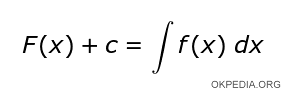How to calculate indefinite integral in python
To calculate the indefinite integral of a function ( antiderivative ) in python, we use the integrate() of sympy.
integrate(f,x)
- The first argument f is the integrand function.
- The second argument x is the integration variable (dx). The variable must be defined as a symbol.
The output is the primitive function F(x).

Note. It is the inverse operation of the derivation. For this reason, the indefinite integration is also called antiderivative.
Examples
Example 1
This script calculates the indefinite integral of f(x)=2x.
import sympy as sp
x = sp.Symbol('x')
sp.integrate(2*x, x)
The first statement loads the sympy library.
The second statement defines the variable x as a symbol by the function Symbol().
The third statement calculates the integral of the function 2 * x by integrate().
The output is
x**2
The primitive function of 2x is x2.
$$ \int 2x \; dx = x^2 +c $$
Example 2
This script calculates the primitive function of sin (x)
import sympy as sp
y=sp.sin(x)
sp.integrate(y, x)
The output of the function is
-cos(x)
The primitive function of sin (x) is -cos (x).
$$ \int sin x \; dx = -cos x +c $$
Example 3
This script calculates the indefinite integral of x / 5
import sympy as sp
y=x/5
sp.integrate(y, x)
The result is
x**2/10
The primitive function of x / 5 is x2 / 10.
$$ \int \frac{x}{5} \; dx = \frac{x^2}{10} +c $$
